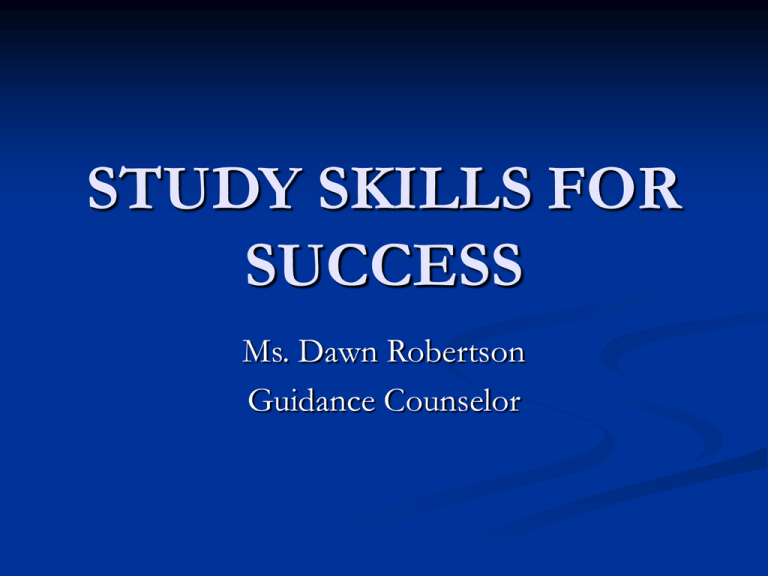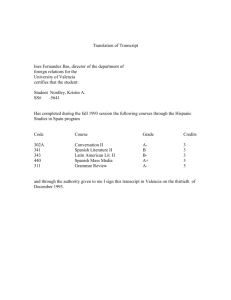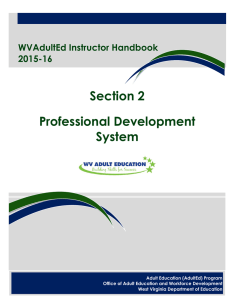STUDY SKILLS06 - High School for Math, Science and
advertisement

STUDY SKILLS FOR SUCCESS Ms. Dawn Robertson Guidance Counselor HSMSE SCHEDULE Alternating A/B Day Schedule Math and Enrichment EVERY DAY Bell Schedule 8:00 - 9:25 9:30 - 10:55 11:00 - 11:45 11:50 - 12:35 12:40- 2:05 2:10 – 3:35 9th 10th 11th 12th Math Algebra/Geometr y Trigonometry Calculus I & II Calculus III Elective Science Biology Chemistry Physics Elective Engineering Intro to Engineering Design Civil Engineering& Architecture Digital Electronics POE Or Mt. Sinai Thesis Project (PLTW) Or Mt. Sinai History World Civilizations I World Civilizations II American History Economics Government English English I & II English III& IV English V & VI English VII & VIII Physical Education PE I & II PE III & IV Health & Music PE IV & V PE VI & VII LOTE German I & II or Spanish III & IV German III & IV or Spanish V & VI German V & VI or CCNY Spanish Optional Elective The Permanent Transcript Grades will remain on transcript for academic career Obtain records from middle school of any regents exams taken and high school credits earned- check records for accuracy Talk to middle school guidance counselor about transcript ACADEMIC CHALLENGES: Time Management 8-4 school day A/B day Homework Ego Management Academic rigor Natural talent WHAT WORKS FOR YOU??? Develop a system to help keep you organized. BINDERS A Day Binder B Day Binder Enrichment folder/notebook NOTEBOOKS Folders BUY A STUDENT PLANNER ASAP! HOMEWORK Keep all assignments in one place. Don’t depend on the web, but use the school website to double check assignments. Try to do all homework the night you get it. TIME MANAGEMENT Consider creating a HW schedule, in which you structure your time to help keep you focused. Spend no more than 45 minutes on a HW assignment . If you are struggling with the assignment, write what you can, displaying your process. Write questions and be specific about what you do not understand. Breaks: No more than 15 minutes!!!! No multi-tasking!!! websites, computer games, phone calls, IM, Internet surfing, T.V., e-mail friends, etc. Focus on the assignment ONLY- and then have fun when you are finished! Listen to music, only if it helps you to focus, not if it’s distraction. Study at least 2 days before an exam. HSMSE Support Services Progress Reports Peer tutors Lunch and after-school tutoring Advisory Groups Counseling Successful Note Taking Created by Linda Leech Academic Advisor Student Support Services Minnesota State University, Mankato 3/3 Why take notes… Notes provide an outline of the main points and facts Improves your retention of the material Helps you master the subject Provides you with a study guide to help you prepare for tests Why you should improve your note-taking skills You’ll be more alert in boring classes You’ll learn more in each class Time in class will be more meaningful You’re creating outlines to study from You’re developing a life skill Memory tends to fade soon after class Ways to improve your memory: Review your notes immediately if possible Review all notes within 24 hours or better yet, before going to sleep that night Read your notes out loud Review your notes regularly, not just right before a test Review your notes with a study buddy Long term memory is what counts when you are taking a test and in your future career Reviewing your notes Actors memorize lines for a play by reciting their lines out loud repetitively Know when to efficiently use your short term memory vs. long term By reviewing your notes you will hopefully see the structure being built Name Cornell System of Note taking Give yourself plenty of room here Possible test question Review map on pg 12 in textbook Jot down questions you may have Class Date Draw a vertical line top to bottom, 1 ½ inches from the left edge of the paper Write your notes to the right of the line Reserve the area to the left of the line for key word clues & sample questions Fill in the left-hand column when you review your notes Highlight the main ideas Show the relationship among the main idea Organize minor points, related details, facts, and examples Listening Be alert in class and participate Listen for material not in the text Don’t call it quits early! The final 10 min may cover as much as first 40 If you disagree, don’t tune out! Learn your instructors signals Instructors often emphasize main points Listen with 2 purposes in mind To learn the material presented Identify test questions Listening continued… If you take notes constantly, you may record all the important points but be too busy to think about them The human brain can process incoming spoken info about 400 words per min and people speak less than 100 wpm Before you write evaluate importance Don’t be afraid to ask your instructor to slow down or repeat Capture the main point and condense When instructors talk fast or you can’t understand them… Take more time to prepare for class Be willing to make choices Exchange copies of notes w/classmates Leave empty space to fill in See instructor after class and show what you missed Use a tape recorder (w/permission) Take notes on your text leaving lots of room for lecture notes to be added in during class Go to the lecture again Learn shorthand and abbreviations Ask questions Ask the instructor to slow down Take shortcuts whenever possible… Drop out nonessential words, like “a”, “the”, etc. Tidbits Noting your own ideas is a good way to maintain your concentration Highlight your notes or use symbols, underline, different colors, etc Underline, or put a star in the margin for material you’ll be tested on Write down assignments in your planner right away Use post it notes to write down any questions for the teacher or your tutor.






